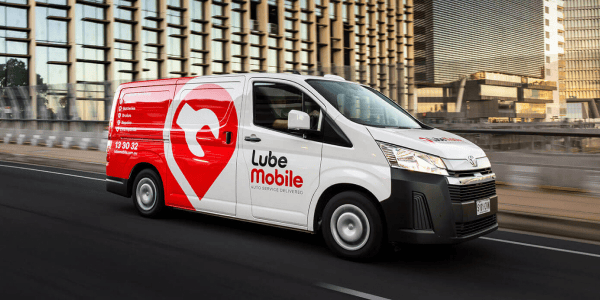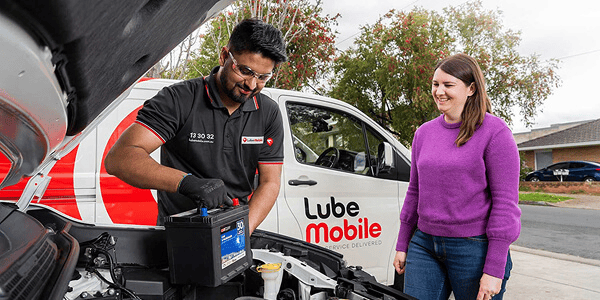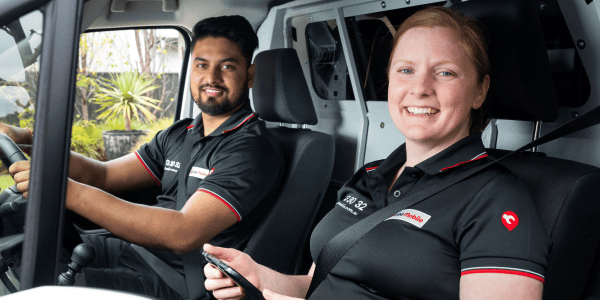CV Joint Services
FULLY QUALIFIED MECHANICS - QUALITY PARTS AND BRANDS
Lube Mobile are the easy-to-book experts at all types of gearbox and driveline repair. We come to you!
What does every Lube Mobile driveline repair include?
-
 Convenient onsite service by fully qualified mechanics
Convenient onsite service by fully qualified mechanics -
 Honest, upfront pricing with no hidden extras
Honest, upfront pricing with no hidden extras -
 12-month / 20,000km nationwide warranty
12-month / 20,000km nationwide warranty
We come to you for gearbox and driveline repair
Whether your transmission is slipping, you've sprung an oil leak or your gearbox needs an overhaul, Lube Mobile will come to you.
We repair all types of gearbox and driveline problems at a time and place to suit you. We only use quality parts and oils on your vehicle and all our work comes with a 12 month/20,000km nationwide warranty.
As driveline repair experts we can also fix your noisy or worn out tail shaft, universal joints, differential, axle and wheel bearings as well as a range of clutch related problems.
Our mobile mechanics come to your location fully equipped to perform a total gearbox and driveline overhaul, but due to the size of some of these repairs, it may be necessary for us to take your vehicle to our local workshop (which we will arrange for you). Got questions? Ask us. It's easy to book online or call 13 30 32 to make an appointment today.


Why hire a mobile mechanic?
Take the hassle out of car repair. We come to you!
Lube Mobile is the convenient and cost-effective way to get quality car repairs done quickly. From simple maintenance and battery or parts replacement to engine repair and no-start recovery, our mobile mechanics have been delivering doorstop auto service for over 40 years.
We cover all of Sydney, Melbourne, Brisbane, Perth, Darwin, Canberra, Hobart and Adelaide as well as many regional centres around Australia. Every Lube Mobile van is equipped with the right tools to get your job done wherever you are, no matter what make and model of car you drive.
Lube Mobile customers love the one-to-one interaction of having a qualified mechanic come to them, because it keeps them in control of cost. Plus, because we are Australia’s largest network of mobile mechanics, we can normally reach you by the same or next business day.


Why choose Lube Mobile for car repairs?
Convenient onsite service
Qualified mechanics that do the work at your location.
Same or next day appointments
More vans on the road means we can get to your car faster!
The highest quality parts and brands
We only use the best quality parts, oils and equipment on your vehicle.
12 month / 20,000 km warranty
We back all our work with a nationwide parts and labour warranty.
About CV Joint Repair
In the CV joint (abbreviation for constant velocity joint), the CV boot is what holds all the lubricant to keep it functioning properly. The boot provides housing to keep all the grease and other lubricants that protect the CV joint from wear and rust. Without the CV boot, the constant velocity joint will quickly deteriorate and then you’ll be up for a large repair bill instead of a simple boot replacement.
The boot of a CV joint can easily be damaged. This is most often caused by road debris or simply age. When the boot is in poor condition it can tear and rupture. This will lead to the expulsion of grease around the joint and causing it to fail. In the worst-case scenario, when constant velocity joints break, you’ll lose control of the car and it may be difficult to steer.
The CV joint should be a part of the checks performed during a car service. When you book in for any car repairs, they should give the entire cv shaft a check over to make sure that everything is running as it should. For any services, you can call Lube Mobile and our mobile mechanics can go through the checks they need to complete on your car as a part of their standard servicing.
Lube Mobile is your local mobile mechanic and we have been operating for over 30 years. We have serviced thousands of CV joints and we exactly know what you’re looking for and how to make sure your car is running in the best condition possible. We have vans operating across Australia in all major towns and cities, including Sydney, Melbourne, Brisbane, Perth, Darwin, Canberra, Hobart and Adelaide. For a complete list of the areas we operate in, please feel free to check our website, or call us on 1300 302 664.
How do you check a CV joint?
One of the easiest ways, or certainly a sign of an early problem, is that when you perform a U-turn. If you hear a clicking sound when you turn, it might be a warning sign. Find an area where you can complete several U-turns and try to replicate the noise. Then park the car in a safe spot and check underneath the car.
With the help of a small flashlight check around the CV boots. These are cone-shaped rubber covers that go over the joints. On most cars, you should have four of them. Start by checking the side that you hear a noise from. Use the flashlight and look for any grease spots. The boots should be free from any grease, if you see anything there may be a leak or split in the rubber.
A split in the rubber seal of a joint is a sign that the boots are worn and need replacing. If the problem has been caught early enough all it might need is a boot replacement and the refilling of lubricant around the joint. To protect your car, the boots should be replaced immediately and a mechanic will check over the joint to make certain that no further damage has occurred.
What are the symptoms of a bad CV joint?
Any part of your car going bad is never a good sign, but when that part caters to the car’s movement, such as steering or the axles, it can lead to huge problems. One of the best ways to stop this from happening is being aware of the noises, smells and sounds of your car. The minute that something does not seem right, it needs to be checked over by a professional. If you have trouble getting your car to a mechanic, this is where hiring a mobile mechanic like Lube Mobile is perfect.
Some of the classic signs that your CV axles and joints are not performing at their best are:
-
Knocking sounds from the wheels
-
Clicking or loud sounds when turning
-
The car feels like it is bouncing rather than a smooth ride
-
Grease on the wheels or tyres
-
The car is vibrating more than usual
Any of these signs could be a sign that your joints are not working as well as they should. You can perform a check on the CV joints yourself to see if there are any visible signs of wear. But, in many cases, it is best to have a mechanic check them for you.
How hard is it to replace a CV joint?
Unless you're a skilled mechanic, it can be best to leave the repair of a CV joint up to a professional. As they are easily damaged if not installed properly and can require special tools to get all the parts removed and replaced. In most cases, it can take a few hours to replace a constant velocity joint properly. The cost will depend on the type of car you drive and the availability (and expense) of the parts.
For many vehicles, the cost of the replacement joint is not excessive, but the overall repair can take around two-three hours depending on the complexity of your car. Any mechanic should be able to give you an estimate on the cost of replacing the constant velocity joints on your car.
Having a skilled mechanic fully examine the CV joint, CV axle, and CV boot will give you a good guide for what parts need to get replaced and what is okay to keep going. With some cars, it may be cheaper (and more worthwhile) to replace the entire assembly. When you hire Lube Mobile, we can advise you on what your best options are, and how to proceed with your car repairs.
How much does driveline repair cost?
The longer you leave a gearbox or driveline service, the more expensive the potential repair could become.
The exact cost of a gearbox or driveline repair will largely depend on the age, make and condition of your car. Because your driveline will collect metal particles and debris over time, a driveline service is considered preventative maintenance as it will stop your entire transmission or gearbox from failing prematurely. In newer cars, the manufacturers have guidelines that must be adhered to, especially if the car is still under warranty, but for most modern cars you can expect to pay between $200-$500.
Once we've arrived at your location, our mechanics will inspect your vehicle and your driveline and then provide you with an itemised quote of the work required. We will never proceed without your approval, and because we do the work at your location, it's easy to ask questions.
Most of the cost involved in replacing your driveline is for labour, as for most cars the engine will need to be removed. Having the initial inspection done at your location keeps you in control of price, as our qualified mobile mechanics will help you to decide if repairing or replacing a part is the most affordable solution for the long term life of your car.


Not sure how to book a Lube Mobile repair?
It's easy to book a qualified mechanic who comes to you.
Tell us where you are
Type in your postcode and discover a qualified mobile mechanic near you now!
Tell us about your car
We are able to work on a wide range range of popular makes and models
Select a service
Even if you don't know what's wrong, we'll come to you, inspect your vehicle and supply a quote upfront.
Pick a time and place!
Tell us where your car is and a qualified Lube Mobile mechanic will be with you soon.
Frequently asked questions
What areas do you cover?
Lube Mobile is Australia’s largest network of nationwide mobile mechanics and has mobile vans operating all over Australia.
Our mobile mechanics operate 6 days a week across every major city and many other regional towns and areas across Australia including Sydney, Melbourne, Brisbane, Perth, Darwin, Canberra, Hobart and Adelaide.
Whenever you search for a mobile mechanic ‘near me’ or auto service or auto repair ‘near me’, you’ll find a Lube Mobile mobile mechanic van is never far away.
It's easy to use our online booking system or you can call one of our operators on 13 30 32 to arrange a time and place that suits you. Our mechanics are all fully qualified and experienced and are able to work on a wide range of popular makes and models.
Check out our full range of nationwide locations here.
How soon can a Lube Mobile mechanic get to me?
Because we are Australia’s largest network of mobile mechanics, we can usually arrange same or next business day bookings.
Our fully qualified fleet of mechanics are ready to perform a wide range of routine auto services or one-off repairs so you can stay on the road the convenient and cost-effective way.
Call 13 30 32 to arrange a time or book online via our easy to use online booking platform.
How much does it cost?
This always depends upon what you need, if replacement parts are required and the make and model of your vehicle.
We always strive to give you a fixed price up front via an itemised quote and we will never start working on your car before we get your approval. This lets you be in control of costs and help you decide whether repairing or replacing a part is the most cost-effective solution.
If you are unsure what is wrong with your car and just need a mobile mechanic to come out and fix it, we have a Repair Call Out fee which includes the first 15 minutes of labour. After this, we charge a competitive hourly rate in 15 minute increments.
Need a mobile mechanic?
Book a routine service or repair today and we’ll come to you at a time and place that suits your schedule! Because we are Australia's largest network of mobile mechanics, we can usually reach you by the same or next business day.
What is the warranty on your work?
Every Lube Mobile service and repair is fully guaranteed.
Because we believe in the expertise, professionalism and attention to detail of our mechanics, we back all our work with a 12 month / 20,000km nationwide warranty.
Our warranty covers:
- All parts and fluids supplied, installed or serviced by Lube Mobile technicians.
- All labour performed by Lube Mobile mechanics for a period of 12 months or 20,000km, whichever comes first.
As a customer focused business for over 40 years, we stand by the quality of our work. In the event of a problem with any Lube Mobile service or repair, we will:
- Send another Lube Mobile mechanic out to you as soon as possible.
- Call you back to to ensure you get the service you deserve.
Read more about Lube Mobile's nationwide parts and labour warranty.
Why should I book Lube Mobile for car repair?
Convenience, Quality, Flexibility and Trust.
Lube Mobile is proud to be one of Australia's most trusted brands, with a 40-year+ track record of delivering quality mobile car maintenance and repair.
Here are 4 reasons to book Lube Mobile for your next service or repair:
Convenience
Getting your car serviced or repaired on your driveway at home - or at work - takes the hassle and unnecessary expense out of car maintenance. Forget about waiting for your car to get seen to in an overbooked garage, paying for a tow or arranging rental cars - we come to you!
Quality
We only use the highest quality parts and oils on your car, and all of our mechanics are fully trained and qualified to perform a wide range of maintenance and repairs on a wide range of makes and models. We also back our work with a 12-month/20,000km warranty on parts and labour.
Flexibility
Because we are Australia's largest network of mobile mechanics, we have more appointment times to suit your schedule. This means that depending on where you are in Australia, we can usually reach your by the same or next business day!
Trust
Even if you're not sure what kind of service or repair your car needs, a qualified Lube Mobile mechanic will diagnose your issue at the car's location, provide you with an itemised quote of the work and any parts required, then carry out the job in front of you. Got questions? Ask us. Our friendly mechanics are here to help and won't start the work until you approve it.
Need a mobile mechanic?
Book a mobile service or repair today. We come to you!